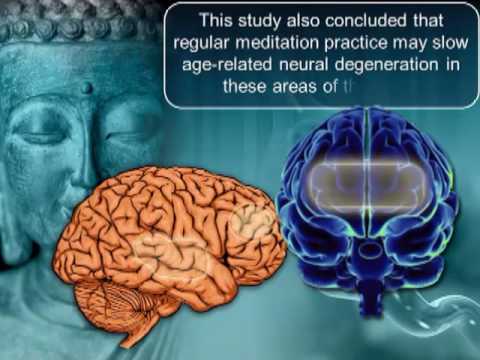Meditation :
David Lynch explains his understanding about consciousness, creativity and the brain. He says that Transcendental Meditation played crucial role in developin…

David Lynch explains his understanding about consciousness, creativity and the brain. He says that Transcendental Meditation played crucial role in developin…

Mindfulness-based stress reduction therapy has been shown to reduce anxiety in a broad range of clinical populations, as reported by the University of Ottawa. Meditation reduces stress and enhances forgiveness, according to a study published by the Journal of American College Health. Meditators have a greater ability to moderate the intensity of their emotional arousal during stressful situations, say the Russian Academy of Medical Sciences.
Studies from Yale and Washington University have shown that mindful meditation increases your brain’s levels of GABA, DHEA, melatonin, serotonin, HGH, and endorphins. Meditation effectively combats the effects of depression by reducing your levels of the stress hormone cortisol.
Because meditation increases these beneficial brain chemicals, it is a simple way to combat the effects of depression. It reduces stress, relieves depression and anxiety, and lowers your blood pressure, according to research published by the National Institute of Mental Health.
GABA (Gamma Aminobutyric Acid)
GABA is an important neurotransmitter found in the central nervous system. It inhibits the production of stress-producing hormones, such as cortisol.
Insufficient amounts of GABA in the body are linked to tension, anxiety, insomnia, and epilepsy. GABA supplements help to correct mood disorders.
Sufficient levels of the neurotransmitter are essential for proper brain function. In a Yale study, scientists found that people suffering from panic disorders or addictions have considerably lower amounts of GABA.
Studies show that people who meditate or use binaural entrainment on a daily basis have significantly increased levels of GABA. Researchers at the University of California hypothesize that meditation produces its anxiety-reducing effects by promoting GABA action in specific areas of the brain, via a mechanism similar to the effects of synthetic anti-anxiety and tranquilizing agents.
DHEA (Dehydroepiandrosterone)
DHEA is a hormone found in the adrenal gland. Research suggests that DHEA can have a number of health benefits, including:
alleviating depression
regulating sleep
reducing stress
improving memory
increasing friendship drive
improving overall psychological health
DHEA deficiency has been linked to obesity and chronic fatigue, as well as heart disease, diabetes, cancer, osteoporosis, and rheumatoid arthritis.
Meditation has been shown to dramatically increase levels of DHEA in the body. According to a study published in Biological Psychiatry, patients who were given DHEA experienced significant improvement in their depression, as well as improved memory performance.
Melatonin
Melatonin is an essential hormone produced by the pineal gland located in the brain. Levels of melatonin in the blood rise at night, allowing for restful sleep. It is also a very powerful antioxidant. Studies at the Washington School of Medicine have discovered that there is a significant link between low melatonin levels and weight gain, especially around the stomach area.
Low melatonin levels severely inhibit your ability to get adequate sleep. Lack of sleep increases the production of hormones such as leptin and cortisol. Too much of these hormones cause you to gain weight, in addition to making it difficult to lose weight.
Practitioners of mindful meditation have been found to have considerably above-average levels of melatonin, according to a study published in Biological Psychiatry.
Serotonin
Serotonin deficiency can lead to a variety of physical and psychological issues, such as:
obesity
depression
mood disorders
insomnia
narcolepsy
sleep apnea
migraine headaches
premenstrual syndrome
fibromyalgia
Serotonin is a vital neurotransmitter which is needed for proper function of the brain. Serotonin elevates mood and increases energy.
Many medications for mood disorders work by boosting serotonin levels. People who meditate have significantly increased levels of serotonin in their body.
Endorphins
Endorphins are neurotransmitters created in the body to internally alleviate pain. Endorphins are responsible for increased pleasure and an overall sense of well-being. They also lower blood pressure and are believed to fight cancer.
People who consistently practice mindful meditation have been found to have considerably higher levels of endorphins. Aside from meditation, exercise boosts endorphin levels as well, causing the pleasurable feeling you get after exercise.
Human Growth Hormone (HGH)
HGH supplements are becoming increasingly popular, though the risks of taking HGH in supplement form are widely debated. HGH is responsible for facilitating growth during childhood, and it sustains your body’s organs and tissues throughout your life.
As we get older, our ability to produce HGH gradually diminishes. This in turn causes increased body fat, decreased motivation, decreased muscle mass and general body weakness. Research shows that meditation can cause increased HGH levels.
Cortisol
Cortisol is a stress hormone produced by the kidneys. Overproduction of cortisol can accelerate the aging process, and over a long period of time has been linked to these ailments:
increased abdominal fat
chronic stress
high blood sugar
weakened brain function
decrease in muscle mass
decreased bone density
elevated blood pressure
suppressed thyroid function
heart attack
stroke
increase of bad cholesterol
decrease of good cholesterol
Mindful meditation has been proven to decrease cortisol levels in your body. A study published in the Annals of the New York Academy of Sciences in 2004 found that older women who regularly practice meditation may have a reduced cortisol response to stress, and that the longer the women have been practicing, the less likely they are to react to stress with high levels of blood cortisol. In another study conducted at Chulalongkorn University in Thailand, 52 males experienced reduced cortisol levels as well as quicker reflexes after practicing Buddhist meditation.
Michael Locklear is a researcher and consultant with 30 years experience, studying health, nutrition, and human behavior. He has been president of the Global Peace Project since 1986, and he adminstrates the websites Natural Remedies for Depression and Quick Weight Loss Tips as part of the Global Peace Project educational outreach program.
Clinical Psychologist guided mindfulness meditation exercise titled “Acceptance of Thoughts and Feelings”.

Dr Fred Travis explains what happens to the brain when someone practices the Transcendental Meditation technique. For more information visit – https://secrets2meditation.com/goto/?url=http://www.TM….
Video Rating: 4 / 5

Interview of Dr. Fred Travis, Director of the Center for Brain, Consciousness, and Cognition at Maharishi University of Management (www.mum.edu) by Krešimir …
Video Rating: 5 / 5

Full length download link: www.brainsync.com Positive thoughts produce positive results. The only problem is that some of our most persistent, selfdefeating beliefs are stored deep in the unconscious, where they have the power to undermine our happiness and sabotage our success. Now you can effortlessly change those negative beliefs to produce the results you want. Special combinations of brain wave frequencies are harmonically layered in soothing music to trigger heightened states of receptivity. Here the unconscious is primed to receive and act on a new set of ideas. Subliminal messages are deeply absorbed by the unconscious to immediately impact your sense of self, your creativity and the dynamic expression of your power in the world. Instructions for Listening Listen to this program every day for six weeks. Be on the look-out for coincidences and acknowledge even the smallest synchronicities as they occur. Once your subconscious has fully absorbed and integrated the subliminal messages, reality conforms to what your subconscious mind believes. The results are profound. Track 1 can be used anytime and anyplace; while working, relaxing, exercising, reading or even sleeping. The subconscious mind has the capacity to absorb subliminal messages without special attention from the conscious mind. Track 2 is designed to be used with stereo headphones to maximize the benefits of the brain wave frequencies. When listening with headphones, find a time and place where you are not …
Article by Thomon Wardle
If you’ve already tried your hand at yoga, then you may also have dipped your toe into the world of meditation. It’s powerful stuff and not just for people who grow pot and eat nothing but raw fruits. It’s something that I try to do everyday as it’s something that keeps me grounded and calm. It also helps with my intuition and inner confidence.
Recently, somebody in the academic world – namely the University of Wisconsin – noticed that meditation isn’t just some ‘new fangled’ practice, but it has great potential. A scientific study concluded that meditation can reduce stress, help with immunity and even help your brain to work better. Who would have thought that just by meditating for a few minutes every day, you’d be able to benefit from so many outcomes.
How to do it. It’s not difficult to do and if you want to try it for yourself, then all you need to do is to sit comfortably. Next, close your eyes and concentrate on your breathing. Feel the air as it passes up your nostrils and into your lungs. Do it again and concentrate so that you can do it slower and deeper. Whatever thoughts you get, then notice them but let them pass. Keep your focus on your breathing. When your mind wanders, bring it back and refocus on your breath. Once you’ve done this for 10 to 15 minutes – then you’ve successfully meditated.
Find other programs for variety There is plenty of information online about how to meditate. For example, there are websites, blogs and even podcasts that provide guidance on alternative ways to meditate. Some of the styles will take you on an inner visualised journey that will leave you feeling refreshed and rejuvenated. Try looking at the podcasts for iPhone for this type of content.
Let’s just go back to that research for a moment, as there’s something else in there that’s very interesting. Apparently one of the outcomes from this research that was undertaken by the University of Wisconsin, was that meditation is as good for your brain as your body. The researchers up there studied some experienced meditators and found that they had more production of gamma brain waves. These waves have an association with clearer and more focused thinking. These gamma waves weren’t just in action during the time the meditation was taking taking place – they were there around the clock. They also discovered that there was not the typical age related thinning in the area of the brain that is used for attention and sensory perception.
This is all good news for all of us. It means that we can keep active mentally and physically for longer and this can go towards prolonging our health into our later years.
Oh and one more thing that you should know too. Apparently just 40 minutes of meditation can do a lot more for you mentally when it comes to being alert than a 40 minute catnap can. Having a nap can make you feel groggy for up to an hour afterwards, but you won’t need to suffer that if you replace the ZZZs with some meditation.
So with all of that evidence, it looks like meditation is finally being recognised for it’s powers. It will protect you against the negative outcomes of being stressed and tense, and it will support your immune system. It will even protect you against the ravages of time – what’s not to like about this ‘new fangled’ practice!
About the Author
Thomon Wardle is an experienced practitioner of yoga and pilates. Visit https://secrets2meditation.com/goto/?url=http://www.getfitwithpilates.com and view the range of yoga DVDs and pilates DVDs to get started with your weight loss with yoga. There is a free eBook worth £9.95 for immediate download while you are there.
Use and distribution of this article is subject to our Publisher Guidelines
whereby the original author’s information and copyright must be included.
Article by Isaac Eliaz
The Power of “Cortical Folding” aka “Gyrification”In terms of brain health, what exactly is “cortical folding” or “gyrification” and how does it increase your mental capacity? These questions may seem to address complex issues best left to neuroscience, except for one simple practice that directly relates to them: meditation. Researchers have been studying the effects of meditation on the brain for decades, and have come to some important conclusions that may offer further motivation and inspiration for regular–and certainly for aspiring–practitioners of this time-honored healing art.
Published Studies Prove Numerous Benefits of MeditationOver the years, published research has demonstrated that the practice of regular meditation can increase brain density, boost connections between neurons, decrease symptoms of depression and anxiety, provide clarity of thought, and increase positive mood endorphins. Other published studies have shown meditation can improve physical functioning, decrease chronic disease risks, and enhance overall quality of life. These studies demonstrate that regular meditation effectively supports mental, emotional and physical health in numerous tangible ways. In building upon this strong body of evidence, researchers are continuing to deepen our understanding of the profound and inspirational benefits of regular meditation practice in everyday life.
UCLA Researchers Uncover New Benefits of Meditation for the BrainMost recently, neuroscientists at UCLA have shown another fascinating neural effect of regular meditation: the ability to increase “cortical gyrification” of the brain. Cortical gyrification refers to the folding of the cerebral cortex – a function that allows the brain to process information faster. The cerebral cortex is the outermost layer of neural tissue in the brain and serves an important role in controlling memory, consciousness, thought processing, decision making, attention, and awareness. During cortical gyrification, the tissues of the cerebral cortex fold, creating indented fissures and “creases” called sulci and gyri. The sulci and gyri increase neural processing and neurotransmitter communication. In this way, increased gyrification enhances the brain’s capacity for computing information, maintaining focus and attention, creating and retrieving memory, processing logic, and forming decisions.
The neuroscientists at UCLA compared meditators of different experience levels to people who never meditated. In those who meditated, they found significant increases in cortical folding across a wide area of the brain responsible for numerous functions beyond rapid information processing and retrieval. Additional areas of the brain markedly affected by meditation involve emotional and mental health capacities, influencing processes of emotional control, heightened awareness, and introspection. This falls directly in line with some of the more noticeable results of regular meditation, which often include increased compassion for one’s self and others, enhanced self awareness and introspection, and greater emotional stability.
Researchers also found significant increases in cortical gyrification among more experienced practitioners. In other words, the longer a person had been practicing regular meditation, the greater the beneficial changes in their brain.
Promotes Long Term HealthAs a holistic physician and meditation practitioner with over 25 years of experience, I have always strongly believed in the mental and emotional benefits of regular mindful meditation practice. And the physical payoffs are equally impressive. We all know that reducing stress can dramatically improve health on a number of levels. The beneficial effects of regular mindful meditation are shown to protect against and reverse DNA (telomere) damage, boost immune function, reduce cardiovascular disease risks, decrease inflammation, improve outcomes in cancer, reduce side effects of conventional treatment, and increase vital energy and physical capacity.
As regular meditation practice becomes better understood and more widely practiced, more and more doctors and health practitioners are recommending these ancient disciplines to their patients. If you are a health provider, meditation can help you become a better healer and clinician, increasing your diagnostic and therapeutic skills significantly, and allowing you to connect in more meaningful ways with your patients and community. If you are looking for some extra healing energy to improve your own health, regular meditation can provide just the solution.
As demonstrated in the UCLA study, meditation is more effective when practiced regularly. Even just ten minutes a day can offer significant and noticeable benefits over a short period of time. Below, I’ve outlined some tips on basic meditation practice for beginners to get started.
Tips for Getting StartedWhile there are countless styles of meditation practice, one of the most profound is the ancient Tibetan practice of Shamatha meditation. Shamatha means “calm abiding” in Sanskrit. It is intended to help people access their mind’s natural state of tranquility and clarity. The technique involves focusing the breath on a specific object, and letting go of all other thoughts as attention is consistently trained on the process of breathing.
Find a quiet, comfortable place to sit, and pick a small object such as a rock to place on the ground in front of you. Focus your eyes and your breathing on the rock, and as thoughts inevitably arise, simply acknowledge and then release them, letting them slip away with each out-breath. When your mind wanders off, gently bring your attention back to your breathing and the rock, visualizing each inhalation and exhalation going to and from the rock.
Exponential BenefitsAs you become more practiced at meditation, you will likely notice significant improvements in your energy, health and mental/emotional balance. You may find that as distractions and obscurities are peeled away during mindful meditation practice, the space between thoughts becomes greater and more profound. As we slowly turn down the constant chatter of our minds, we can begin to access deeper aspects of consciousness for growth and healing. This peeling process can make room for your true inner nature of love, compassion, peace and tranquility to arise and expand naturally, benefiting yourself and those around you exponentially.
To me, one of the most beautiful and profound aspects of meditation is that this process of growth and unfolding (as well as cortical folding) can continue throughout our lives. After all, we can never have too much love, compassion, and clarity. For more information about the powerful benefits of mindful meditation and the opportunity to join me for a meditation retreat, visit https://secrets2meditation.com/goto/?url=http://www.betterhealthpublishing.com.
About the Author
Dr. Isaac Eliaz, M.D., MS., L.Ac., has been a pioneer in integrative medicine since the early 1980s. He is a respected researcher, innovative product formulator, clinical practitioner, author and lecturer. Dr. Eliaz is widely regarded as the leading expert in the field of Modified Citrus Pectin research and has been using Modified Citrus Pectin in his clinical practice for over 15 years to treat a variety of conditions.

ProfoundMeditationProgram.com – Take the free test drive . . . Meditation Brain http – Receive a free, powerful meditation audio and PDF course on Meditation and the Brain. Visit and “Like” our Facebook page: www.facebook.com